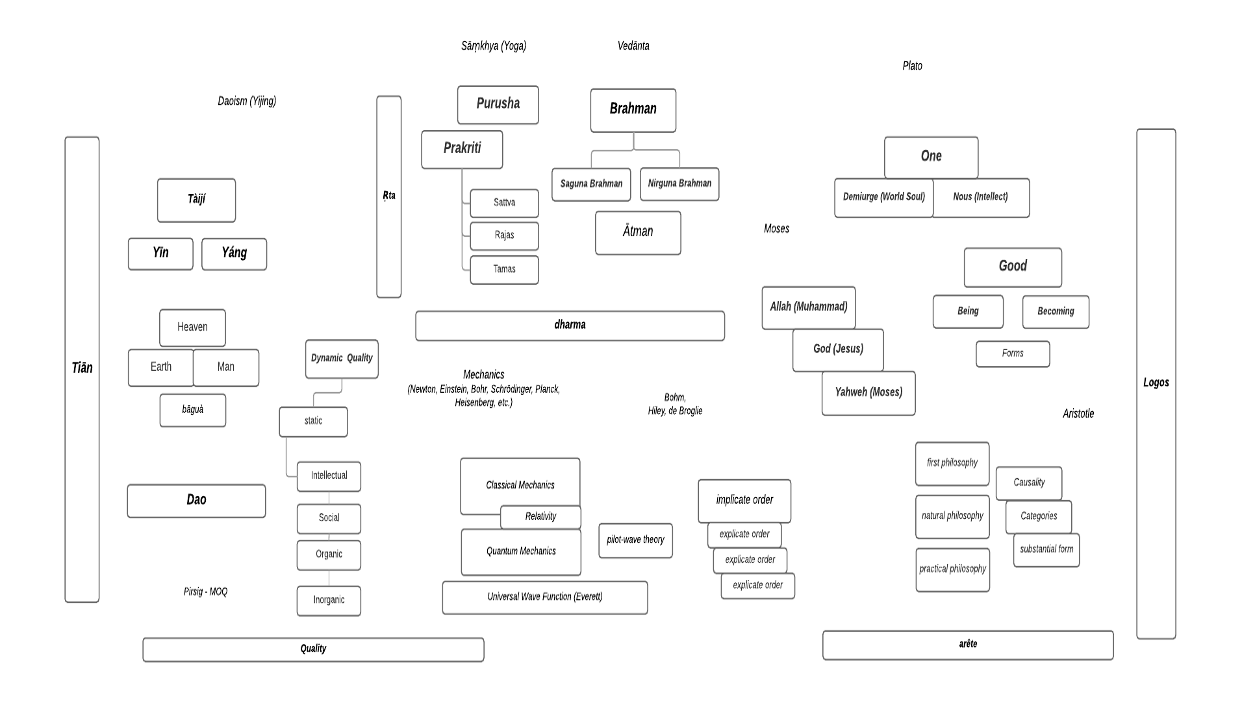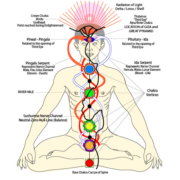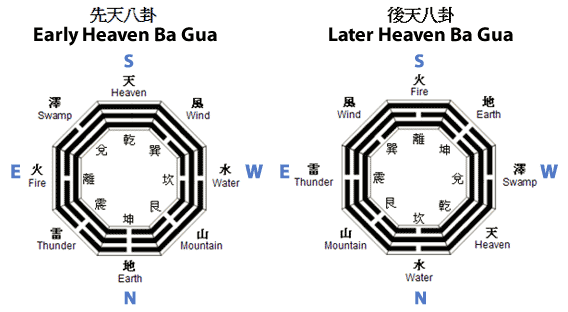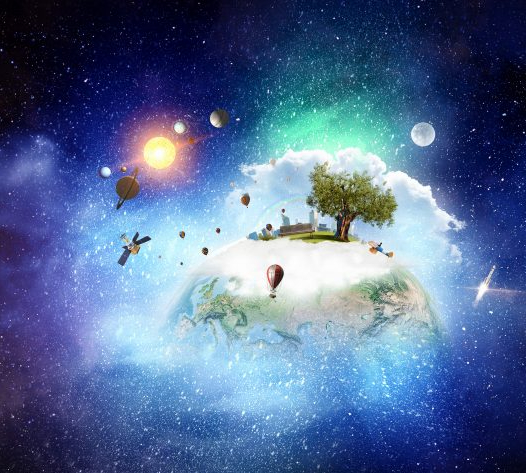Postmodern Metaphysics
In many respects, one can consider the age that we live in, the Quantum Era, as one of intense intellectual crisis and turmoil, very much analogous to the crisis that the intellectuals faced during the Enlightenment Era after the world had almost literally been turned upside down. We see clear indications of this crisis, manifestations as it were, on the world stage with
- global warming: a threat on a scale that we as a global community have ever faced before and has the potential for devastating consequences, some of which are already starting to see. Changing climate leading to shortages of and lack of food and water, large scale people unrest and movement leading to further political instability.
- nuclear proliferation: an increasing number of nation states have access to, and are actively working on, nuclear weaponry,
- rise of radical extremism: aka Terrorism, which primarily is looked at through an Islamic lens but runs deeper than that and is not necessarily a fundamentally religious problem much less an Islamic one,
- the rise of nationalism: aka populism that is sweeping through Western democracies like a cancer almost, Brexit and the rise of Trumpism in the United States as perhaps the most glaring examples, and
- increasing wealth inequality: leading to general unrest and broad class inequality even within wealthy nations, also starting to take root between nations as well,
All of these socio-political trends, and particularly those that are leading to socio-political instability and change, grouped with the threat of Terrorism and nuclear proliferation, together significantly increase the probability of not just instability, but conflict and destruction at a scale that we have not encountered in the history of mankind. Furthermore, many of these threats, or trends, are a direct result of, or at least are partially caused by, ideological differences and/or deficiencies. This is the case in particular with respect to the rise of nationalism, increasing income inequality, as well as Terrorism, both underlying socio-political trends that, when paired with Global Warming and the resulting shift in access to resources, put mankind in a precarious position indeed.
If we take them all together then, given their global scope and reach, and given the ideological basis for at least a core group of them, it is not too much of a stretch to argue that at least some degree (and we would argue to a large degree), these trends are a function of, a direct result of, the proliferation of Western ideology throughout the world which rests on not so much democracy and freedom (although this is what many of our leaders in the West would have us believe), but more so on capitalism and materialism, precisely the hot buttons for the radical extremists, which in turn drive radical (religious) extremism to a large extent.
Therefore, it is a logical and rational deduction to conclude that these trends, these problems and challenges that characterize the modern era within which we live, while manifesting of course on the material or physical plane, if not addressed ideologically, are fundamentally unsolvable – each of them potentially having devastating effects to the global community and all of them together representing arguably the greatest threat mankind has ever faced, certainly modern man.
From a pure intellectual perspective, from a metaphysical perspective, we see analogs for these ideological challenges in the domain of Physics, crystalizing in the search for a so-called Unified Field Theory, a quest first outlined by Einstein after the advancements of Quantum Theory – a theoretical framework which although extraordinarily powerful leading to all sorts of amazing and revolutionary scientific advancements, nonetheless forces us to look very hard and close at the principles of causal determinism and objective realism not just as underlying theories for Physics, but also as theoretical assumptions regarding the nature of the world we live in, as an ontological paradigm no less.
Since the introduction and acceptance of Quantum Theory, we have been exposed to a variety of intellectual paradigms intended to explain how these seemingly contradictory worlds, Classical Mechanics and Quantum Theory, can both be true at the same time – the many worlds interpretation for example, or Bohmian Mechanics which has given us this notion of holomovement and implicate order. Furthermore, these developments in Physics have interestingly led to many proponents of Eastern philosophy to look at some of the underlying foundational precepts of Quantum Theory – locality being perhaps the most prominent of these – as consistent with their ontology, the world as an expression of divine consciousness where the system as a whole informs local events as it were.
We also have at the same time, due in no small measure to globalization and technological advancements ever since the beginning of the 20th century really, seen the spread of Eastern philosophical traditions, mostly in the form of Yoga, throughout the world, beyond the classically “Eastern” borders, having now become almost ubiquitous in the West. While the driver of this spread is arguably mostly materialistic, i.e. an obsession with the body and health, the search for the extension of life and well-being, the philosophical as well as theological implications of this diffusion of worldviews is significant.
For one, the Eastern worldview is not foreign to most people in the West now as it was say at the beginning of the Quantum Era before WWII, and second the idea of an underlying, active consciousness from which both the mind and the physical world manifest, and in turn rest or depend upon for existence, is not a completely foreign or outrageous concept to those who have been exposed to these Eastern philosophical traditions, despite the fact that this notion has for the most part been rejected by the Scientific community.
Also, while the rational foundations of Religion, theology, has been under attack since the Scientific Revolution more or less, now with the proliferation of Yoga and Buddhism and other forms of Eastern philosophy, which integrate theology and metaphysics, along with very specific spiritual practices like meditation, in order to facilitate and demonstrate the underlying ontological truth of said theological belief systems, Religion – at least in the West – is becoming not only an endangered species but is looked upon almost as barbaric in a way, as we see for example in how Islam is viewed in particular which has become very closely associated with radical extremism, i.e. Terrorism.
These trends have not only metaphysical and theological implications, but also moral and ethical ones as well. A further attack on the religious establishment while (superficially) many may not have a problem with, and many in the atheist community especially directly espouse, leads us to the very precarious position again as to the basis of, and fundamental attributes of, morality and ethics.
The problem effectively runs across a variety of intellectual lines but, like alcoholism or drug addiction or any problem for that matter, the first step to solving said problem is recognizing that there is in fact a problem. It’s not clear that we as a global community have reached that conclusion yet – not just for each of the individual problems we have laid out, but even the level of crisis that we are at given the scope of all of the problems put together.
Having said that, certainly a step in the right direction is to try and establish the proper and appropriate intellectual framework out of which the solutions to these problems – each of them individually and then the group of them collectively – at least have the potential of being solved. Because while these problems are on a scale that we have yet to encounter in the history of mankind, they still nonetheless require action at the individual level in order for us to at least have a fighting chance to solve them. Politics is local as they say. Furthermore, given the scale of some of these issues and their inherent complexity, socio-political structures need to be established that again have the appropriate intellectual paradigm or worldview such that the problems can be attacked and addressed at the nation-state and global level – a two-pronged approach as it were.
From the author’s point of view at least, in order to establish the proper and appropriate intellectual framework we must truly recognize – from an epistemological perspective – that the underlying ground of existence, what we have called supraconsciousness, is not just some ethereal thing that a few crazy mystics or sages have experienced and some folks have written a book about. That this whole “the kingdom of God is within” message from the son of a carpenter some two thousand years ago, and the countless other messages from saints and prophets throughout the ages, is not just a bunch of hog wash. Anything less than this, anything that is purely empirically or rationally based that does not have any theological implications, simply does not go far enough, or deep enough, to address some, or perhaps all, of these issues.
God – if he does indeed exist – needs to be placed on former, more realistic, footing such that morality and the social good in and of itself is not a “liberal” or philosophical idea, but is the most practical of rational deductions that is based upon the fundamental understanding of the interconnectedness of all living beings – again not on just an intellectual or ethereal level, but on a practical and very grounded level as reflected in the “mystical” experience as it is understood by the Eastern philosophical traditions. And if he does not exist, well then off he goes into the intellectual and metaphysical trashbin, forcing us to construct an intellectual paradigm based on need within the context of the crises of our time rather than due to any theological certainty. Either path represents a necessary condition for us to make it successfully through the crisis of our time and move beyond it, given the scale and complexity of these challenges and threats that are confronting us.
To get there, in terms of providing and informing the rest of the disciplines that will need to be brought to bear on these problems, we must start with Philosophy – determining to what extent if at all can these mystical frameworks that are buried into the collective mythos of man can be laid out in a pure rational model, as required by Philosophy as a discipline in and of itself in modern academia. As opposed to starting with the assumption that there exists a divine being, i.e. God, from which the universe – and us – have been created which is no doubt fraught with problems. But the problem is more difficult than it appears, the decks are stacked against us as it were, because even the very description of the problem is tainted with the problem. We live in a fundamentally dualistic world where that which is perceived and the perceiver are forever separated by a veneer of objectivity.
The subject-object-metaphysical presumption of reality, as expressed in the full range of epistemological solutions that have been provided over the millennia, is baked into the very semantics of our language making it almost impossible to break free from. This is why Pirsig felt the need to come up with an almost indefinable word, a word indefinable by nature, that sits above the whole intellectual paradigm, in order to try and capture it in some way, i.e. Quality. This was the same solution that the ancient mystics of the East came up with as well of course, using words like the Dao, or Brahman, to reflect that which was undefinable, and to a large extent even unknowable, but yet at the same time played a profound role in the creation and preservation of the universe and all life within it.
As an example, if look at ontology as a Philosophical discipline, one of the dominant undercurrent themes of this work of course, and one of the more active and thriving fields within Philosophy today – we find implicit within the word, the discipline, itself, this same objective paradigm of existence that we are trying to move away from. – ontology is the science of, or study of, being or reality – but by whom? If there is a verb, there must be an actor against it, and presumably – although less restrictively – an object as well. This is in fact an Indo-European linguistic construct – subject verb object – providing a tremendously powerful intellectual tool through which we can not only explore our reality, our world – describe it, articulate it, improve upon it, etc. – but also persist information and knowledge itself so that the sum total of knowledge is carried forward from one generation to the next with a high degree of specificity.
Almost relentlessly though, subject-object-metaphysics is embedded into not just our intellectual framework, but even our linguistic framework as well, leaving us with a classical chick and egg problem as it were. Once that linguistic invention is applied, we are left with the foregone conclusion that our worldview must be reductionist – it has to be, because that is the only way we can express anything, in any Indo-European language really, the language family that that has provided the linguistic, and effectively the intellectual, foundations of the West. Every time you try and solve it you go further down the rabbit hole as it were.
This is why in order to solve the problem, bridge this intellectual divide as it were, one is almost forced to revert back to the initial theo-philosophical solutions that were presented by the very first philosophers in the West, by Plato, Aristotle, and others that were the forefathers of Western philosophy, as well as in the Eastern traditions as well such as in the Upanishads in the Indian tradition, which although are still hamstrung with this subject-object-metaphysical worldview that is baked into their language, nonetheless made provisions for this fundamental unified, holistic, monistic, mystical, supra-intellectual, supraconscious construct, to be described somehow. This was the Being of the early Hellenic philosophical tradition (Plato primarily), the One of the Neo-Platonists, and the Satcitānanda (or somewhat anthropomorphized Brahman) of the Upanishads.
So linguistically then, we are almost forced to go back to the very foundations of theology, metaphysics really, in order to connect this very ancient notion of God as an integral aspect of his creation – God is everything, God is in everything and as such is the ground of all experience and in turn is the (intellectual as well as physical and spiritual) ground of experience in and of itself – this is essentially what we find in Upanishadic philosophy as Satcitānanda and in the West is reflected perhaps most eloquently in the Neo-Platonic One. In these initial intellectual systems, the philosophia of the West, although the semantic structure was laid down as a function of the Indo-European subject and object based linguistic constructs, effectively the foundations Western thought, of Science, these ancient systems nonetheless did not carry the same sort of reductionist emphasis that we are confronted with today, as they are seen reflected in the mirror of Science as it were, after Philosophy as a discipline split between natural and theoretical lines.
This takes us to the ancient Hellenes once again, with Plato primarily as the perhaps the first metaphysician and theologian, although certainly not the first philosopher. Despite his rational bent, he still nonetheless captured in a way that ancient mystical quality that is characteristic of the Paleolithic religions throughout Eurasia which preceded him – what we refer to quite broadly as shamanism. This mystic quality is again best captured in the Platonic philosophy of Plotinus, the quintessential Neo-Platonist – his doctrine of the One which manifests itself, via emanation of sorts, into the many by way of the Divine Intellect, or Nous.
Neo-Platonism from a mystical and theological standpoint in fact is eerily similar to its Indo-European brother on the Indian subcontinent, the philosophy we find implicit to the Upanishads which forms the basis of Vedānta. Here we find the notion of the single, divine principle as well, referred to as Brahman, a metaphysical abstraction of Brahmā, the creator of the universe in the Vedic mythos – minus the numerological significance inherent to the Neo-Platonic One of course, one of the distinctive features of Hellenic philosophy. Then, through the cosmic ordering principle of Ṛta, which comes to be understood in the later Indian philosophical tradition – and Buddhism – as dharma, the cosmos is brought into existence, corresponding quite elegantly to the Neo-Platonic Nous, a sort of Divine Intellect that is rational, i.e. reflects a sense of order, but at the same time is intelligent in the sense that it reflects a being of some kind, something that is “alive”.
Furthermore, in both Neo-Platonism as well as with Upanishadic philosophy (as well as with Christianity as well in fact) we find this all-pervading cosmic principle reflected in the individual in the notion of the Soul, the last of the great triad of metaphysical and theological constructs in Plotinus’s interpretation of Plato which corresponds again quite neatly to the Upanishadic Ātman, the individual manifestation of Brahman through which his (or her) creation is experienced. Implicit in this characteristically Indo-European theo-philosophy is that man is created, or exists, in the image of God – one of the fundamental Indo-European theological tenets in fact and one which we can see implicit in the Upanishads, but also embedded in virtually all of Hellenic philosophy as well which in turn forms the basis of Judeo-Christian theology.
In the Chinese tradition, they are somewhat less hamstrung, and came up with the notion of Dao, which is more process (change really) based than it is based upon any sort of subject, or object, or experience. It’s a way, a path, an experiential process of “living”, of “being”. The metaphysics of the Yìjīng supports this as the Dao, as a theo-philosophical principle or tenet, runs almost orthogonal to the Yìjīng when looked at through a metaphysical or philosophical lens. From this perspective, the Yìjīng not only describes Fate itself, but also provides a framework for coaxing out of it potential future outcomes given a) a totality of possible states of “being”, and b) knowledge of the relationship of these states to one another, and c) an identification of the current state of “being” that best describes the current “situation” as it relates to the total possible set of states of possible existence.
This is the power of the Chinese theo-philosophical framework, it doesn’t try and solve an epistemological “problem”, or even a metaphysical one, but it does present (at least one possible) ontological solution, as well as – quite ingeniously – a means by which one can have dialogue with It. “It” in this case being the primordial ontological system itself within which you as an experiential, process and change based entity that sits within the Earth-Heaven-Man paradigm of universal order exist.
This is why the Eastern philosophical systems in particular have become so appealing, because – in their inherent language which reflects their worldview – the reductionist ontology is (almost) entirely effaced – it has no room to exist. The entire vocabulary of the systems in question require you to abandon it. And it is with the language, the vocabulary itself, that the solution really shows itself, manifests as it were. It is therefore along these lines we must look, to the very first philosophical systems that were created in antiquity, to the very origins of philosophy in ancient times, because it is at the very beginning of the establishment of the philosophical tradition that we have our best chance, in terms of vocabulary and model, to re-integrate that which was lost when we went down the reductionist and materialist path through and via Science.
But these ancient philosophical systems, which are just as much theological as they are philosophical of course, despite their power in integrating the so-called mystical directly into the philosophical framework as it were, nonetheless are lacking in terms of – given the time period within which they emerged and were developed – integrating the last millennia or so of intellectual developments, as reflected specifically for example in the domain of Science, i.e. Physics as it has evolved through the Copernican revolution, Newtonian Mechanics and then most recently with Quantum Mechanics. They also of course do not address the philosophical advancements that have run in parallel to these advancements on the empirical side as reflected most poignantly by Kant, whose work effectively integrates the empiricist (materialist) and rationalist (idealists) philosophical schools that had evolved and countered each other since the very dawn of philosophy, civilization really, in the West.
Kant gets us a little closer from a metaphysical standpoint, directly integrating experience into philosophy as the very ground of epistemology. But God in Kant’s philosophy is an intellectual construct, a necessary condition of his Metaphysics of Morals, but nonetheless not the ontological penultimate principle in any way. To Kant, it is Reason that is the benchmark of truth, Reason as an abstract construct that exists within, and is ultimately bound and defined by, mankind’s ability to perceive or understand, i.e. cognate. Kant’s epistemology is fundamentally Psychological, and therefore his metaphysics is Psychological just as much as it is rational.
Neo-Metaphysics: A Modern, Synthetic Theo-Philosophical Perspective
At first the work was an attempt to define a new metaphysics, but in order to do this successfully, a new epistemological framework is required – a new model with new semantics that integrates the notion of the direct experience of God as, if possible, a firm element of truth from which in fact all truth, all knowledge, stems from. While Pirsig’s Metaphysics of Quality hints at a new ontology, his new paradigm based upon the metaphysical notion of Quality doesn’t truly integrate the mystical experience in a meaningful way. While it’s present, it’s almost an afterthought given the focus of his work on the metaphysics of value really, from which a broader and more encompassing system of morality can effectively be inferred. But while it’s an extraordinarily powerful model no doubt, arguably revolutionizing metaphysics and Philosophy, it’s an altogether Western paradigm from a theological standpoint, even if it is not reductionist, or at least partially reductionist, in its hierarchical structure.
Looking at the problem from a further level of abstraction as it were, it would seem that a requisite step along the path toward a resolution, or at least an amelioration, of some of these issues that are reflective of the proliferation of this characteristically Western ideology taken to the extreme (not sufficient but necessary) would be to try and establish a more firm metaphysical structure, a new ontological paradigm, within which this characteristically Eastern philosophical notion of mysticism could be integrated with Western philosophy, with Reason really.
In other words, it would seem that what we have is a philosophical problem, in the sense that there must be something fundamentally missing from our basic core intellectual paradigm through which not only individual decisions are being made, but also on a grander scale at the sociological as well as political level, such that we are ending up with problems on the scale that we have today, continually reinforcing the challenges and problems that effectively define the current era of crisis that we are in – the so-called Quantum Era.
Furthermore, at a more detailed level staying within the domain of Philosophy, it’s an ontological problem in the sense that it is some higher order of reality that is required in order to explain the full range of phenomenon – phenomenon in this sense as not just physical phenomenon (objective reality), not just psychological phenomenon (subjective reality), and not just experiential reality, but a reality within which experience itself can take place as a phenomenon in itself. It’s an epistemological problem in the sense that our current notions of knowledge – how a thing can be known as well as the inverse which is effectively how we define “the world”, or at least “the world that can be known” – are again wholly inadequate for the job at hand.
To put it succinctly, what we need here is an epistemological paradigm that contains within it the full range of phenomenon, the expansion of the notion of phenomenon in fact, to include not just the physical (the objective reality of the materialists and the empiricists like Aristotle, Epicurus, Bacon and Locke among others), and not just the rational (the idealistic and rationalistic reality Plato, Descartes and Leibniz for example), and not just the psychological or experiential which subsumes both (like Kant for example – or even Freud or Jung), but a reality that describes all of the above within a paradigm that is
- philosophical in the sense that it is fully rational,
- metaphysical in the sense that it is supra-physical and supra-rational and covers the range of phenomena which includes things and ideas,
- theological in the sense that first principles, arche, are fully integrated (rather than left outside of it as defining attributes or characteristics like categoriesfor example in the philosophy of Aristotle and Kant)
If this is possible, if we can maintain consistency, rationality and coherence and still achieve these three goals, we can achieve much in terms of establishing an ontological and metaphysical paradigm that rests on much broader and firm ground, and increasing its applicability beyond just the domain of Philosophy such that it can provide an intellectual foundation for mankind to tackle some of these great challenges it is faced with.











We no longer live in a post-modern world, but in a transition period to a new Middle Ages full of irrational worldviews. The greatest danger is the new mental illness of hygien-terror, that I spread across the world in one year.
It seems like while the scientific worldview given to us by the Enlightenment has enabled to progress in technology and living standards, scientific materialism has led to some sort of famine of spirituality and wisdom. I have been following the professor John Vervaeke who has a wonderful series called Awakening from the Meaning Crisis. His posits that that knowledge in the modern era has been to ‘propositional knowing’ as we discredit other forms of knowing such as forms of participatory knowing such as embodiment etc.
Yes, we need to re-evaluate our worldview based upon our current understanding of Science but not limited to it. It required a new mode of thinking, topic of my latest work
would be interested in reading when you complete:)
Just going to publishing now, will start posting some of the content here in the next week or two